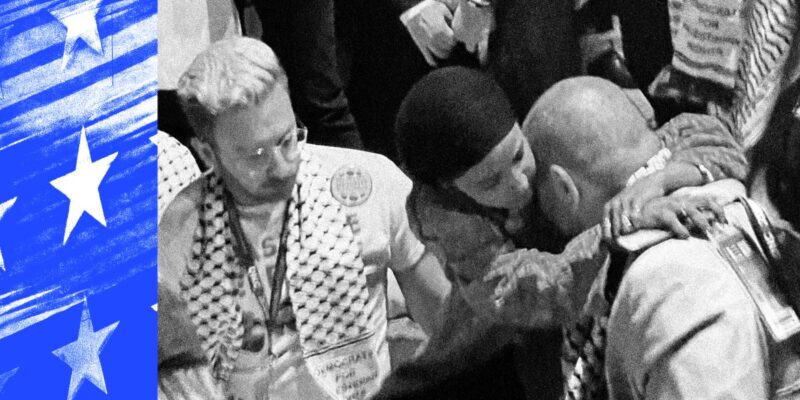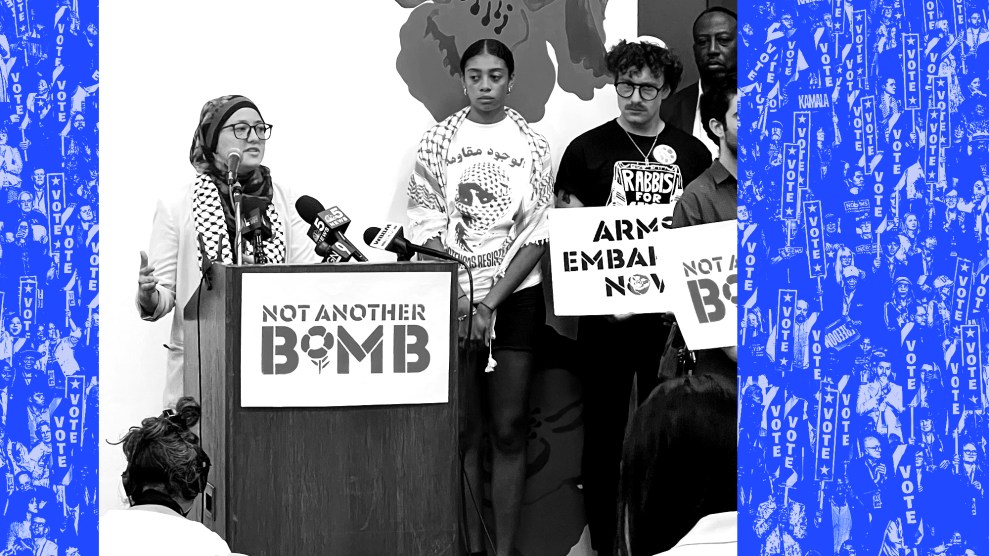
On Wednesday night, the Uncommitted Movement called a surprise press conference outside the United Center Arena. Under giant glowing signs of Vice President Kamala Harris and Minnesota Gov. Tim Walz, delegate Abbas Alawieh announced that a few hours earlier the Harris campaign had given him a call. After about two months of asking, the Uncommitted movement had gotten the news: They would not be granted a speaker at the Democratic National Convention.
That means, barring any change, not a single Palestinian or Palestinian-American will be given the chance to step on to the DNC stage. Alawieh, a longtime Democratic congressional staffer—a man who has dedicated his life to working within the system—said he was “stunned” by the refusal of the request: “I said, what do you mean? We just want our voices to be heard.”
Here Is the Speech That the Uncommitted Movement Wants to Give at the DNC
At the DNC, Republican staffers have been offered the chance. An Uber lawyer who is high in the campaign got a prime-time slot. But not a single Palestinian has been given even five minutes on that stage. The Uncommitted movement tried, as Alawieh explained, to appease. He said they offered the DNC an extensive list of potential speakers—even offered to find a Palestinian speaker who would endorse Kamala Harris from the stage. (That, as Alawieh noted, “is a hard thing to do” in this moment.) They offered to send a pre-written speech, with promises not to deviate from the script.
“I’ve had some pretty crushing days, but to be honest today took the cake,” Ruwa Romman, a Palestinian-American Georgia State Representative posted on X. Romman was one of the speaker candidates Uncommitted gave to the Harris campaign. “I do not understand how there’s room for an anti-choice Republican but not me in our party. I need someone to explain to me what to do now.”
This was the smallest and most immediately achievable of the Uncommitted movement’s demands, a matter of simple representation. Their larger goals—a ceasefire, an arms embargo, the end to the killing of thousands of Palestinian children with American bombs—went unmentioned. And, nonetheless, the answer, after weeks of silence, was “no.”
At the press conference, Alawieh picked up his phone and returned the Harris campaign staffer’s call in front of allies and reporters. “No it is not acceptable,” he said. Then, he sat down on the sidewalk and refused to move. “Call me if you change your mind. Thank you. Please pass it on. Tell the vice president that I’m sitting outside. I’m not going anywhere. I hope you change her mind.”
As of 9:00 am on Thursday, with Harris ready to accept the nomination, Alawieh was still sitting on that sidewalk. He was joined by delegates June Rose, Sabrene Odeh, and Rima Mohammad. Supporters brought them blankets to sit on, as they struggled to get comfortable on the concrete.
News of their sit-in spread. Representatives like Cori Bush (D-Mo.) and Alexandria Ocasio-Cortez (D-N.Y.) facetimed the group. About 30 minutes into the sit-in, other Democratic groups representing voters began speaking out. Muslim Women for Harris-Walz stated that they could not continue advocating for the ticket in light of this decision. The United Auto Workers tweeted that “if we want peace, if we want real democracy, if we want to win this election,” a Palestinian must be allowed to speak from the stage. Bend The Arc—a progressive Jewish PAC that rarely speaks on international issues—sent a rabbi to join the sit-in. Rep. Ilhan Omar (D-Minn.) arrived on the ground around 11:00 and hugged Alawieh, who sobbed into her shoulder. As the clock ticked past midnight, delegates took turns speaking about the over 10,000 Palestinian children the IDF has killed, about the targeting of civilians that is clear in Gaza’s hospitals—and about their hope that, maybe, the Democratic Party would listen to them and stop the violence.
Everyone at this protest thinks the families of hostages should have spoken today and were glad they did.
So why can’t a Palestinian-American elected official have the same luxury?
— Kat Abu (@abughazalehkat) August 22, 2024
The Harris campaign did text a counter-offer. A speaker “is not happening,” they said. Would the Uncommitted movement want to send representatives for a private meeting instead of speaker time? Uncommitted representatives might have taken that meeting three weeks ago. Now, though, it’s being offered as a way to deny a Palestinian presence “on the stage of a party that professes equal rights for all,” as Uncommitted organizer Waleed Shahid put it.
The denial comes in the light of a convention that has tried to a paint picture of big-tent solidity among Democrats.
The night before the denial, former President Barack Obama preached to the DNC audience about the need for unity. “Our politics have become so polarized these days that all of us—across the political spectrum—seem so quick to assume the worst in others unless they agree with us on every single issue….Our fellow citizens deserve the same grace we hope they’ll extend to us.” Obama went on to chide the left of his party for not extending sympathy to those who do not always want to vote for Democrats. “If we want to win over those who aren’t yet ready to support our candidates, we need to listen to their concerns and maybe learn something in the process,” Obama said.
And yet that grace, it seemed—that choice to listen and learn—did not extend to allowing a Palestinian to speak from the DNC stage. Instead, the Uncommitted delegates stayed on that sidewalk waiting. They plan to sit there for the remainder of the convention.
“My back hurts, my body’s fatigued…it’s just a shock to the system,” Alawieh said early on Thursday morning. “I suppose most acts of blatant suppression, exclusion, and silencing are.”
He still seemed confused, after waging a campaign coded in all the respectability Democrats demand from dissenters: “We talked to the DNC, we offered options, we said we’ll identify someone who is willing to express support for Vice President Harris…we did everything right, you know?”
Noah Lanard contributed reporting.
Editor’s note: The author of this post and other Mother Jones workers are represented by UAW Local 2103.
















